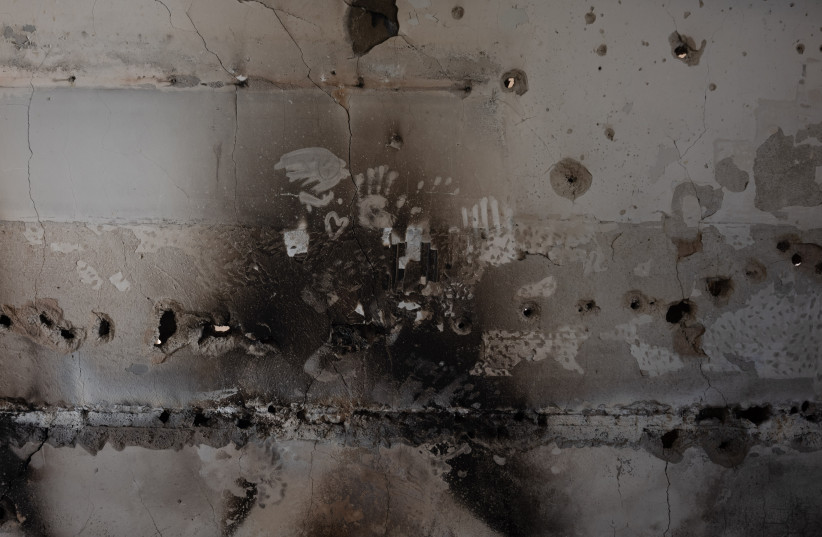Netanyahu, you are not free of blame for October 7
A month and a half before the October 7 massacre, opposition leader Yair Lapid joined Prime Minister Benjamin Netanyahu at a security briefing with his military secretary, during which they received warnings about the dire state of Israel’s security, Lapid told the civilian probe on Thursday morning.
He said Netanyahu looked “bored and indifferent.”
According to Lapid, the secretary described “intensified activity across the board – the Iranians, Hezbollah in Lebanon, and the terrorist organizations in Gaza and the West Bank” and said that “all of these organizations had identified weakness on the Israeli side, internal rifts, tensions, and a loss of military preparedness, alongside an emerging diplomatic crisis with the United States.” Lapid considered the information “unambiguous and exceptionally grave.”
However, Lapid added, Netanyahu paid no mind.
While Netanyahu denied these claims and said there was never any such briefing, it is undeniable that the prime minister had plenty of warning beforehand that Israel’s security was not in a good state.
In June 2023, four months before the October 7 massacre, Netanyahu, during a security briefing, revealed to the Knesset’s Defense and Foreign Affairs Committee that he was aware of the potential for a multi-front war, including Gaza, and emphasized the need to prepare for conflicts involving Iran, Lebanon, and Gaza simultaneously.

At that briefing, which was disclosed in December, over two months into the war, Netanyahu warned about the possibility of escalation, despite not wanting it to happen.
So, Netanyahu, in the presence of several MKs and ministers, recognized that Israel was at risk, although, after the war broke out, he spent ample time insisting that he was never exposed to any clues that would even remotely suggest that something as terrible as October 7 was coming.

Then this past May, the IDF revealed that Netanyahu received four warning letters between March and July 2023 from the Intelligence Division concerning how Israel’s “enemies” perceive the societal divides in Israel, such as the controversy surrounding the judicial reforms. They viewed it as a window – a way in.
Once again, Netanyahu’s office denied this, claiming the letters suggested Hamas didn’t want to attack from Gaza and was inclined toward an agreement.
In June this year, Netanyahu gave his first interview to Hebrew media since the outbreak of the war to the right-wing Channel 14, during which he insinuated that threats by protesters against his government’s judicial reforms to stop serving in the IDF reserves played a part in Hamas’s decision to attack Israel on October 7.
“The refusal [to serve] is a disaster, and it created illusions for our enemies,” he stated.
Furthermore, he said that the pre-October 7 IDF assessments indicated Hamas was deterred, so he was unaware of the impending threat.
He argued against forming a national investigation committee at the moment, citing the need to focus on the ongoing war. Of course, that would be convenient for him, as it would keep him and his extremist coalition out of the watchful eye of an official probe.
Yahya Sinwar, the chairman of the Hamas Political Bureau, then sent a message to senior Israeli officials in July, hinting at potential unrest in prisons and hostage-related issues. The letter heavily hinted at a security crisis like the one Israel faced on October 7. Both Netanyahu and Defense Minister Yoav Gallant received the message and engaged in discussions about it.
Netanyahu’s interview with Time Magazine…and the fact check following it
NETANYAHU HAS demonstrated, time and again, that he will take every opportunity to refute any blame thrown at him for October 7; he denies deserving even the slightest criticism.
Two weeks ago, shortly after Time Magazine published an interview with the Israeli prime minister, it ran a fact-check of the interview and found that once again, he was pushing away any fact that points the finger of blame at him.
Netanyahu claimed in the interview that every government has transferred funds to Hamas. However, Time noted that it was Netanyahu’s previous government that began the transfer of funds, with a horrifying $30 million a month going into the Gaza Strip in 2014.
The magazine also pointed out that in 2012, Netanyahu reportedly told journalist Dan Margalit that Hamas should stick around as a counterweight to the Palestinian Authority, thereby expressing how it would be beneficial for him and his government for there to be chaos among Palestinians.
Finally, he claimed in the interview that October 7 “showed that those who said that Hamas was deterred were wrong.”
However, he was the one who told Channel 14 in the months leading up to the attack that he had prevented a future attack from the enclave thanks to a 2021 operation.
No, Prime Minister, I have no reason to trust your word or believe in you now, as you have proved so often that truth is not the priority when it comes to denying blame.





Comments are closed.